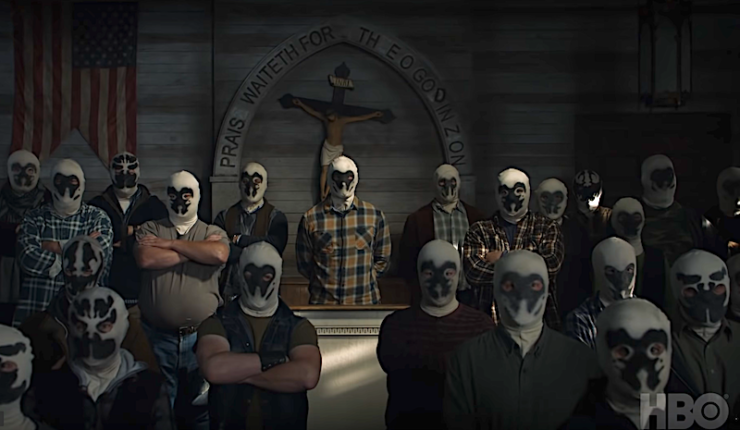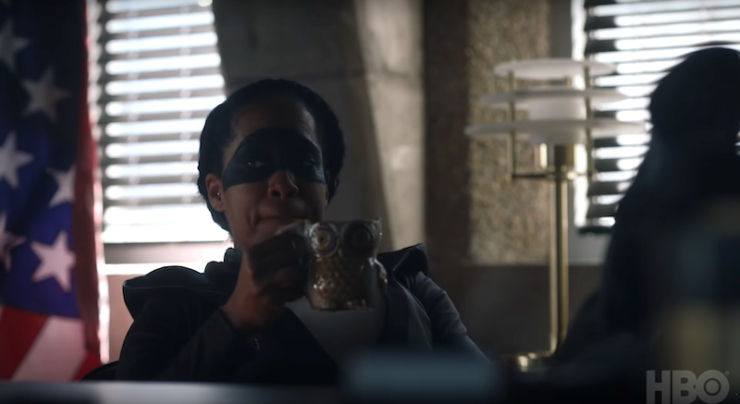Is it worth it to watch the Watchmen—Damon Lindelof’s nine-episode remix/sequel that takes place in a modern version of an alternative United States? Based on the first hour I’m going to say yes, that Lindelof and his team have done the improbable and built a compelling work of television that justifies adding on to an iconic story. The opening episode, “It’s Summer and We’re Running Out of Ice” is absolutely riveting, and plays with familiar Watchmen iconography in surprising ways.
I’ll give some backstory and review the episode below—making sure to mark out any spoilers as we go. And let me know what you thought of tonight’s episode in the comments!
Well that was an amazing hour of television. It immediately throws down a gauntlet by opening on the thing white people call the Tulsa Race Riots—though it’s better to call it an attempted genocide. In our timeline (specifically in the Spring of 1921), a group of white terrorists attacked “Black Wall Street,” the Greenwood District of Tulsa, Oklahoma, burning businesses to the ground, murdering hundreds of people, and injuring thousands more. In the timeline of Watchmen, this attack still happened, but the future the show cuts to is vastly different from the one we know today. (I’ll talk more in the spoiler section below.) Up here I’ll simply say that show is clearly tackling racism, vigilantism, and terrorism head-on, while also starting what I’m guessing will be an amazing conversation about police violence.
The performances here are note perfect. Regina King is tough and warm and deeply, unexpectedly funny as Detective Angela Abar. Tim Blake Nelson does a wonderful turn as laconic lawman Wade. Don Jonson is not just a warm and solid presence as Chief Judd Crawford—he also sings! And Jeremy Irons turns up for a few brief scenes as a character Who Is Not Named…but come on, I think we know who he is.
The action is all fantastic, with a raid on a terrorist cell a particular standout. King’s Abar is utterly believable as a cop-verging-on-mask. And the way the show plays with the iconic image of Rorschach made me shriek with delight.
If the rest of this series is even half as good as this first episode it is definitely worth your attention each week.
I’ve provided some backstory on the series and original comic below, and if you hop down a few paragraphs I’ll get into spoiler territory for the episode itself.
Backstory:
They did it thirty-five years ago.
Watchmen, the deconstruction of the superhero genre from Alan Moore, Dave Gibbons, and John Higgins, hit stands and changed comics in 1986. Its vision of a world changed by masked vigilantes who became popular heroes, a scientific disaster that created a giant blue superbeing, and a tense, violent, borderline fascist United States, raised the stakes of what comics could be about, how adult they could be in content, and how sophisticated in storytelling.
In case you don’t remember, or are just diving into the Watchmen-verse now, here are some basic facts: masked superheroes first took to the streets in the 1940s, with waves of heroes and villains coming out over the next two decades. Some were more effective than others. In 1959, an experiment gone wrong transformed Dr. Jon Osterman into Doctor Manhattan, a true superhuman. Thanks to Manhattan, the U.S. unequivocally won the Vietnam War, and the Cold War was essentially frozen, as Jon could end an attempted nuclear strike with little difficulty. Nixon remained president, Watergate was never uncovered, and the country as a whole took a turn for the fascistic. Then in 1977 the Keene Act passed, making superheroism illegal. Heroes and villains from the second wave of masks choose a different paths: Jon and The Comedian go to work for the government; Ozymandias, “The Smartest Man on Earth” markets his own image and build an empire around his personal brand; Dan Dreiberg and Laurie Juspeczyk retire from active service and try to lead quiet-ish lives; Rorschach goes full vigilante. When the Comedian is murdered and Manhattan is accused of causing cancer to people who are exposed to him some of the masks come back together to investigate, uncovering a conspiracy and learning lots of uncomfortable truths about their pasts and the generation of heroes before them. I won’t say anything else other than even now, thirty-five years after the book’s publication, it’s extraordinary and you should read it if you haven’t.
Many of the characters in Watchmen are skewed version of characters from Charlton Comics, but they play with all sort of archetypes. There are also excerpts from one older hero’s memoirs, newspaper clippings, police reports, and a pirate comic called Tales of The Black Freighter interspersed around the main story. In 2009 Zack Snyder adapted the comic into a film that, not to put too fine a point on it, I LOATHE. (Except for Jackie Earle Haley as Rorshach—he deserved an Oscar.) In 2012 DC Comics released a prequel series called Before Watchmen, and in 2017 the published a sequel, Doomsday Clock. I have avoided all of these takes, because I wanted to hold the original apart in my mind from other adaptations—especially after sitting through the “‘Hallelujah’ Blimp” scene in Snyder’s film. However, as this HBO adaptation seemed to be trying to go in a new direction, and use the story as more of a jumping-off-point, I thought it was worth a discussion.

Spoiler Territory:
It’s 2019, and Robert Redford has been president for nearly 30 years. The police wear masks, just as the masked vigilantes used to do, in order to protect their identities—all of the cops have essentially become the people they fought in earlier generations. By tying the show into the real-life Tulsa Massacre, it centers the discussion on race, which is absent from the comic. And by focusing on the work of a Black female police officer, it allows a perspective on superhero work that was also largely lacking.
Det. Abel and her crew are investigating a terrorist cell known as the Seventh Kavalry. They hide their identities with Rorschach masks, and are currently harvesting synthetic lithium batteries, possibly to create a bomb of some kind. They announce their return with a terrifying video in which they refer to Rorschach’s famous opening monologue by saying that when the “whores and the race traitors” cry for help, they will be the ones whispering no. This implies that Rorschach’s diaries did in fact get published by the right-wing New Frontiersman and made it out into the world.
Another Rorschach allusion comes in the form of Wade, who wears a mirrored mask and interrogates criminals. He seems to be able to read their responses to questioning in an enhanced way—whether that’s the mask or a superpower remains vague. In general it seems that people may be somewhat more super-powered than in Moore and Gibbons’ comic, but I guess we’ll find out as the show continues. The Seventh Kavalry raid is the meat of the episode, showing the police working together as a team. We also see that one of Nite Owl’s old flying contraptions is still in use, this time as a kind of flying police flamethrower.
Those poor cows.
We learn that the boy from the Tulsa Massacre survived, and is now uncannily aware of Det. Abar’s actions. After the raid on the Seventh Kavalry leads to the ambush and murder of Chief Crawford, he’s the one who alerts her of her colleague’s death.
OK, and now, let’s talk about Jeremy Irons for a second? Obviously he’s Ozymandias. He lives in a castle, and has a maid and butler who attend on his every move, and who might be androids? They throw him an ‘anniversary’ party, giving him a cake and a watch. But the cake seems to be made of honeycomb, and they’ve wrapped the watch in a pelt, and the butler, Mr. Phillips, attempts to hand him a horseshoe to cut the cake? Hence, I’m guessing androids. The maid is played by Sara Vickers, and Sleepy Hollow’s Tom Mison has apparently returned to my Sunday nights as Mr. Philips. Ozymandias is writing a play! It’s called The Watchmaker’s Son! I’m sure this is going to go great.
Allusions:
- When Will Reeves is sent out of Tulsa, his father tucks a note into his jacket with the words “Watch over this boy” written on it. But who is meant to watch over him?
- A TV feed shows Doctor Manhattan on Mars.
- While doing a cooking presentation for her daughter’s classroom, Det. Abar refers to being born in Vietnam right before it became the 51st State.
- Poster in classroom: “Anatomy of a Squid.”
- Poster in classroom: “Important American Presidents” includes Washington, Lincoln, Nixon, and Redford.
- Luckily an alarm sounds before the Squid Rain (????) begins to fall.
- A Smiley Face is made of eggs on a glass plate.
- OWL. MUG.
- The terrorist organization Seventh Kavalry is mining batteries from old watches.
- There’s a TV show playing called American Hero Story: Minutemen.
- A man asks Angela Abar: “You think I could lift 200 lbs?” in what I’m assuming was a reference to Unbreakable.
- People believe that Veidt’s squid was a hoax perpetuated by the government.
- A drop of blood hits a police badge in a riff on The Comedian’s bloody Smiley Face
- While there is no “‘Hallelujah’ Blimp” moment, there is a scene between Detective Abel and her husband, Cal, that will totally erase it from your mind. Whew.
So what did everyone think? Let us know below, and if you haven’t watched the show yet please beware of spoilers in the comments!
Leah Schnelbach needs to hear the story on that baby squid rain. Come discuss theories with them on Twitter!










